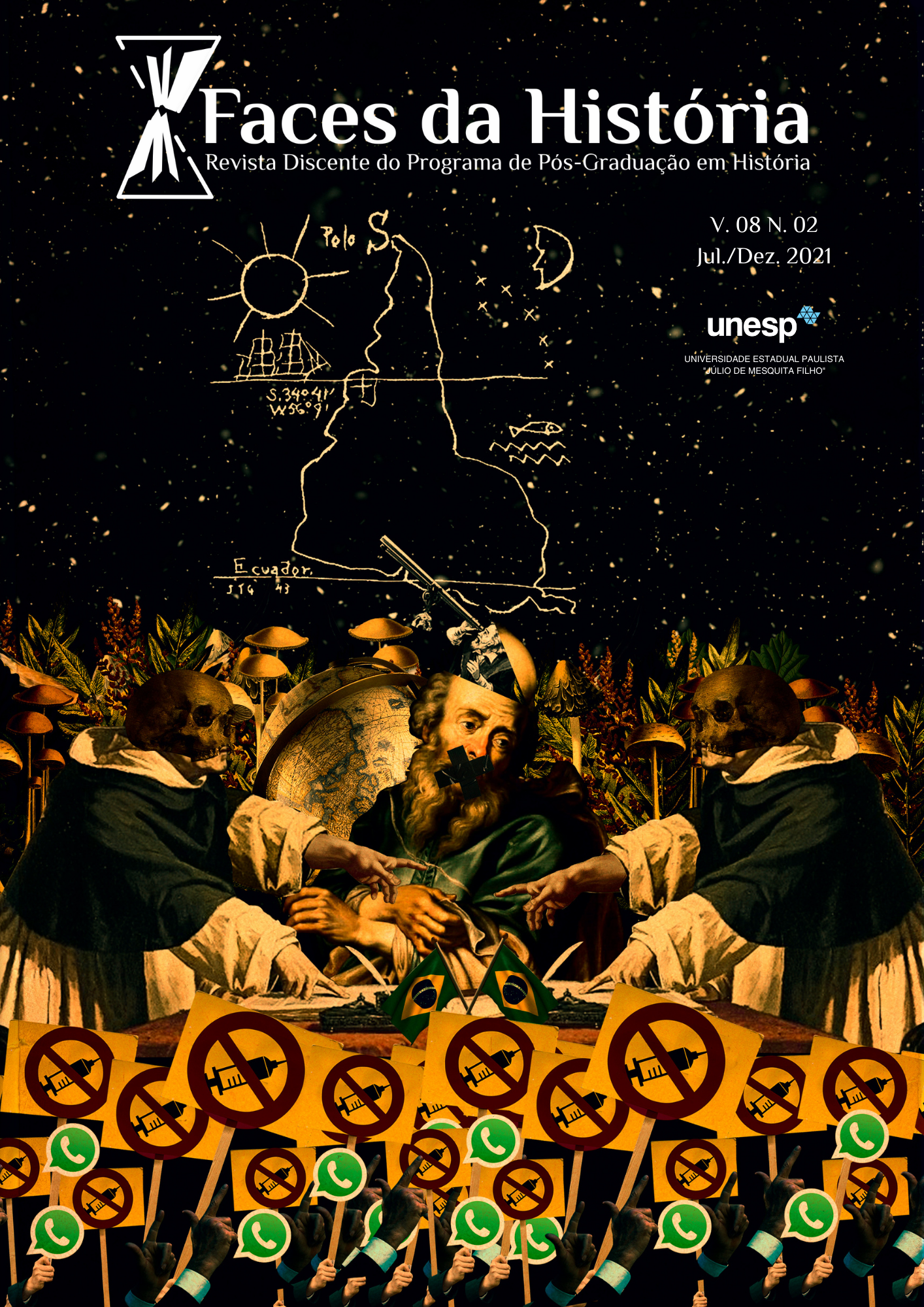Apolônio de Tiana e Seus Discípulos
Elementos Religiosos no Antigo Magistério Filosófico
Palavras-chave:
Filóstrato, Apolônio de Tiana, DiscipuladoResumo
Filóstrato (c. 170-247), um sofista da época romana, escreveu, entre outras, uma biografia de Apolônio de Tiana (c. 3 a.C.-97 AD), na qual atribui ao filósofo e curandeiro grego feitos extraordinários que lhe teriam valido a admiração de vários discípulos e que lhe teriam possibilitado o exercício de um magistério profícuo e politicamente relevante. É, portanto, o propósito deste artigo avaliar alguns dos princípios fundamentais do discipulado empreendido por Apolônio, embora sob a compreensão de que a biografia não corresponda exatamente ao Apolônio histórico; ela revelaria, em vez disso, os estereótipos e as expectativas relacionadas ao discipulado religioso da época romana, especialmente como interpretado na era severiana (193-235 AD).
Referências
ANDERSON, Graham. Philostratus: biography and belles lettres in the third century A.D. New York: Routledge, 1986.
ARQUEIRO, Catarina Lopes. Anacársis ou Sobre os exercícios físicos de Luciano de Samósata: introdução, tradução do grego e notas. 2011. 78 f. Dissertação (Mestrado em Poética e Hermenêutica) – Universidade de Coimbra, Coimbra, 2011.
BILLAULT, Alain. Les choix narratifs de philostrate dans la Vie d’ Apollonios de Tyane. In: DEMOEN, Kristoffel; PRAET, Danny (Eds.). Theios sophistês: essays on Flavius Philostratus’ Vita Apollonii. Leiden: Brill, 2009. p. 3-20.
BOWERSOCK, Glen Warren. Greek sophists in the Roman Empire. Oxford: Clarendon, 1969.
BOWIE, Ewen Lyall. Apollonius of Tyana: tradition and reality. In: TEMPORINI, Hildegard; HAASE, Wolfgang (Hrsg.). Aufstieg und Niedergang der römischen Welt:
Geschichte und Kultur Roms im Spiegel der neueren Forschung. Berlin: de Gruyter, 1978. Bd 16.2, p. 1652-1699.
BROWN, Peter. The rise and function of the holy man in late antiquity. The Journal of Roman Studies, v. 61, p. 80-101, 1971.
CAMPBELL, Frederick Williams Groves. Apollonius of Tyana: a study of his life and times. London: Grant Richards, 1908.
CHRYSOSTOMUS, Dio. Orationes. In: VON ARNIM, Hans Friedrich August (Ed.). Dionis Prusaensis quem vocant Chrysostomum quae exstant omnia. 2. ed. Berlin: Weidmann, 1962.
CONYBEARE, Frederick Cornwallis. Introduction. In: CONYBEARE, Frederick Cornwallis (Ed.). The life of Apollonius of Tyana, The epistles of Apollonius and The treatise of Eusebius. New York: Macmillan, 1912. v. 1, p. v-xv.
CONYBEARE, Frederick Cornwallis (Ed.). The life of Apollonius of Tyana, The epistles of Apollonius and The treatise of Eusebius. New York: Macmillan, 1921. v. 2.
DIJK, Gert-Jan. The Odyssey of Apollonius: an intertextual paradigm. In: BOWIE, Ewen; ELSNER, Jas (Eds.). Philostratus. Cambridge: CUP, 2009. p. 176-202.
ESHLEMAN, Kendra. The social world of intellectuals in the Roman Empire: sophists, philosophers, and Christians. Cambridge: CUP, 2012.
FLINTERMAN, Jaap-Jan. “The ancestor of my wisdom”: Pythagoras and Pythagoreanism in Life of Apollonius. In: BOWIE, Ewen; ELSNER, Jas (Eds.). Philostratus. Cambridge: CUP, 2009. p. 155-175.
GYSELINCK, Wannes; DEMOEN, Kristoffel. Fiction and metafiction in Philostratus’ Vita Apollonii. In: DEMOEN, Kristoffel; PRAET, Danny (Eds.). Theios sophistês: essays on Flavius Philostratus’ Vita Apollonii. Leiden: Brill, 2009. p. 95-128.
KEMEZIS, Adam Miller. Greek narratives of the Roman Empire under the Severans: Cassius Dio, Philostratus and Herodian. Cambridge: CUP, 2014.
KÖNIG, Jason. Images of elite community in Philostratus: re-reading the preface to The lives of the sophists. In: MADSEN, Jesper Majbom; REES, Roger (Eds.). Roman rule in Greek and Latin writing: double vision. Leiden: Brill, 2014. p. 246-270.
KOSKENNIEMI, Erkki. The Philostratean Apollonius as a teacher. In: DEMOEN, Kristoffel; PRAET, Danny (Eds.). Theios sophistês: essays on Flavius Philostratus’ Vita Apollonii. Leiden: Brill, 2009. p. 321-334.
MADSEN, Jesper Majbom. Patriotism and ambitions: intellectual response to Roman rule in the High Empire. In: MADSEN, Jesper Majbom; REES, Roger (Eds.). Roman rule in Greek and Latin writing: double vision. Leiden: Brill, 2014. p. 16-38.
MEYER, Eduard. Apollonios von Tyana und die Biographie des Philostratos. Hermes, v. 52, p. 371-424, 1917.
PHILOSTRATUS, Flavius. Vita Apollonii. In: KAYSER, Carl Ludwig. Flavii Philostrati opera. Leipzig: Teubner, 1964. v. 1.
PLATO. Respublica. In: BURNET, Ioannes (Ed.). Platonis opera. Oxford: OUP, 1986. v. 4.
PLATT, Verity. Virtual vision: phantasia and the perception of the divine in The life of Apollonius of Tyana. In: BOWIE, Ewen; ELSNER, Jas (Eds.). Philostratus. Cambridge: CUP, 2009. p. 131-154.
PRIAULX, Osmond de Beauvoir. The Indian travels of Apollonius of Tyana. Journal of the Royal Asiatic Society of Great Britain & Ireland, v. 17, p. 70-105, 1860.
REARDON, Bryan P. Courants littéraires grecs des IIe et IIIe siècles après J.-C. Paris: Les Belles Lettres, 1971.
SCANLON, Thomas Francis. Eros & Greek athletics. Oxford: OUP, 2002.
SCHIRREN, Thomas. The Vita Apollonii as metabiographical fiction. In: DEMOEN, Kristoffel; PRAET, Danny (Eds.). Theios sophistês: essays on Flavius Philostratus’ Vita Apollonii. Leiden: Brill, 2009. p. 161-186.
SILVA, Semíramis Corsi. O Apolônio de Tiana da biografia escrita por Filóstrato e os sofistas. Revista Clássica, v. 29, n. 2, p. 119-144, 2016.
SILVA, Semíramis Corsi. Memórias em torno de Apolônio de Tiana: feiticeiro, homem divino e rival de Jesus Cristo. Revista Antíteses, v. 11, n. 21, p. 368.
Publicado
Como Citar
Edição
Seção
Licença
Autores que publicam na Revista Faces da História concordam com a cessão dos direitos autorais dos manuscritos, processo simultaneamente licenciado sob a Licença Creative Commons Attribution (CC-BY-NC), que permite o compartilhamento do trabalho com reconhecimento da autoria e publicação inicial nesta revista. Dessa forma, a Revista Faces da História pode difundir os artigos e trabalhos publicados, em formatos físicos e/ou eletrônicos, incluindo Internet.




